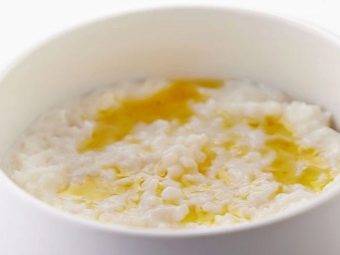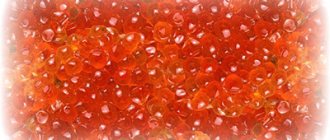Consumption of flaxseed oil and seeds for breastfeeding
- You can only consume natural oil or seeds. When feeding, you should not take dietary supplements, tablets, capsules and various preparations with flaxseed oil additives;
- Seeds or oils should not be eaten in the morning on an empty stomach or as a separate dish. The product is added to an already prepared dish, for example, in salads and snacks, in cereals and yoghurts. In addition, the seeds can be sprinkled on baked goods;
- Oil can be added to both hot and cold dishes;
- Oil should not be heated or used for frying. Due to high temperatures, flax loses its beneficial properties and can even release toxic substances. Therefore, oil is added not during the cooking process, but to an already prepared hot dish;
- To ensure flax is better absorbed, consume it with foods that contain vitamins E and B6. These are various types of nuts and beans, oatmeal and millet porridge, spinach, mackerel and tuna, chicken;
- It is better to start using flaxseed oil or seeds after 1-2 months of lactation;
- For the first time, add no more than a teaspoon of flaxseed oil to the dish and monitor the baby’s reaction after use. If no deterioration in the child’s condition is observed within two days, the nursing mother can occasionally eat the product;
- If your baby shows symptoms of a food allergy, remove the product from the diet and contact your pediatrician;
- The permissible amount of oil or seeds is two tablespoons, but nursing mothers are advised to start with a teaspoon and gradually increase the dosage to a tablespoon and subsequently not exceed these recommendations. A decoction of flaxseeds is taken half a glass once a day.
It is possible, but only with caution: safe dosages
Flaxseed oil is a healthy and necessary product, but it must be introduced into the diet in moderation. It is its constant intake in large doses that poses a health hazard. Half a teaspoon for two months will be enough to replenish the reserves of polyunsaturated fatty acids in an adult.
Pregnancy and breastfeeding are not a contraindication to the use of flaxseed oil, but given its ambiguous effect on the body, it is better to refrain from its systematic use.
To prevent a deficiency of omega-3 fatty acids, it is enough for expectant and nursing mothers to diversify their diet with fatty fish caught from their natural habitat, as well as nuts, seeds, avocados, beans and peas. A couple of times a week you can season vegetable salads with flaxseed oil - there will definitely be no harm from such an amount of product.
Why is it dangerous?
Flax seeds contain plant estrogens, lignans, which are related to human estrogen. On the one hand, lignans may promote the development of hormonal breast cancers. On the other hand, they alleviate the symptoms of menopause and help with hormonal imbalance.
What happens in the body of a young woman (if her hormonal balance is normal), a teenage girl or an infant when they receive plant hormones with food?
- Animal studies have shown that flaxseed phytoestrogens cause developmental abnormalities and increase the likelihood of cancer in offspring.
- Scientists from the University of Pittsburgh Medical Center (USA) report that flaxseed oil can cause problems with pregnancy and also negatively affects the development of reproductive organs in infants.
- In Canada, Anik Berard, a professor at the Faculty of Pharmacy at the University of Montreal, surveyed 3,354 pregnant women and asked them about taking natural products while pregnant. It turned out that the incidence of premature birth was 4 times higher in the group of women who took flaxseed oil in the last two trimesters. Anik Berard asks pregnant and breastfeeding women not to regularly consume flax seeds and flaxseed oil.
- A study of 7 female volunteers confirmed that adding flaxseed oil to the diet increased the levels of EPA and DHA in breast milk. A return to initial values occurs a week after stopping treatment.
- In the article Ph.D. and employee of the All-Russian Research Institute of Flax Growing V.A. Zubtsov writes that during storage, special antioxidants are introduced into flaxseed oil to prevent spoilage. These synthetic substances can be toxic.¹ Until scientists have found safe substances that preserve the freshness of such products, they silently add potentially dangerous preservatives and loudly talk about the benefits of vegetable oils.
Can it be used by a nursing mother?
Most doctors advocate the consumption of flaxseeds.
That is, a nursing mother needs to diversify her diet with this product. Vitamins and amino acids will not only saturate her body, but will also reach the baby. The seeds are an excellent addition to restoring a woman’s immune system. But, like any product, it has its pros and cons. The properties of the seeds increase the productivity of breast milk.
From what month is it included in the diet?
Canadian scientists are against eating flax seeds in the last trimester of pregnancy and the first six months of breastfeeding. This is explained by the fact that it can negatively affect the baby’s intestines, causing disorders. In this case, the seeds are eaten only as a seasoning, and consumption of flaxseed oil on an empty stomach leads to gastritis.
The best time to take the seeds is to wait until the period of colic has passed and complementary feeding begins - 4-6 months.
In any form?
You cannot consume flaxseed oil and its derivatives in the form of tablets and dietary supplements, only natural products.
If you are breastfeeding, you should not take the seeds in the morning on an empty stomach. It is more correct to use during the day, pouring a teaspoon of seeds into the salad or dressing it with the same amount. Towards evening, drink a spoonful of seeds with kefir or other fermented milk product. You can also make decoctions - pour 20 grams of seeds (1 tablespoon) with 1 liter of water and leave in a water bath for three or four hours. The pastries are decorated in shifts.
Benefits during breastfeeding
The positive effect of flax seeds on the body of a nursing mother:
- to restore immunity - helps to resist colds, infections, fungal diseases;
- normalizes intestinal motility, eliminates the problem of constipation that affects women before and after childbirth;
- regulate hormonal levels, normalizing the activity of the thyroid gland - a big plus for the postpartum period;
- rejuvenation – vegetable fat from the seeds nourishes the skin and hair, giving them inner beauty and strength;
- the decoction helps fight against helminthic infections and inflammation;
- increase the production of oxytocin.
It is important that the beneficial properties of the seeds are provided by their unique composition - fiber, vitamins (B1, B2, C, A, E, B, F), microelements (iron, potassium, zinc and magnesium, calcium, phosphorus and carotene), Omega series acids . phenolic compounds
The seeds are recommended for problems with the gastrointestinal tract and kidneys, thyroid gland and blood vessels.
Flax seeds in the diet of a nursing mother
In addition to the development of the child, drinking flaxseed oil during lactation is also beneficial for the mother, since in this way she can recover faster after childbirth.
The benefits of flax oil include the following factors:
- The oil helps strengthen the immune system, which is simply necessary for a young mother during breastfeeding to avoid dangerous consequences.
- After childbirth, a woman can quickly bring her hormonal levels back to normal - this concerns the rapid restoration of the endocrine system.
- Flax oil is an excellent prevention of constipation and other intestinal problems that occur to a woman after childbirth for 2-3 months.
- A useful flax product allows you to restore hair and nails, which in women during pregnancy lose their former shine and health.
Adequate nutrition for a mother while breastfeeding is the key to the proper development of the baby. The mother's body needs not only vitamins and microelements, but also fatty acids, which are not synthesized but come from food. These substances include omega-3 acids - DHA and EPA, the source of which, in particular, is flaxseed oil.
Nutritionists disagree about the safety of using this product during pregnancy and lactation. Let's consider the beneficial properties of flax oil and factors that can negatively affect the health of the mother and baby.
Beneficial features
Flaxseed oil is a source of polyunsaturated alpha-linoleic fatty acid, vitamins E, A, K, F. To compensate for the deficiency of fatty acids and vitamins in a weakened body, it is recommended to take a teaspoon of this oil in the morning on an empty stomach, half an hour before meals. The course of treatment is about two months, after which you should take a break.
With long-term regular use, this product helps:
- Get rid of excess weight. The fatty acids included in its composition act as weight loss activators and increase the effectiveness of the diet;
- Strengthen the heart and blood vessels. The elasticity of the walls of blood vessels increases, the amount of bad cholesterol decreases, blood pressure returns to normal and metabolism is activated;
- Normalize the functioning of the gastrointestinal tract. Consumption of flax oil prevents constipation (which is especially important in the postpartum period), improves the condition of hemorrhoids, has a beneficial effect on the liver, treats gastritis, and prevents the formation of stones in the bile ducts;
- Prevent the development of inflammatory processes, including fibrocystic mastopathy, gout, lupus;
- Improve skin condition;
- Normalize the activity of the nervous system;
- Prevent the development of malignant neoplasms.
It is obvious that flaxseed oil can help a woman’s body quickly recover after childbirth and be beneficial for the development of the child. Read about what foods help a nursing mother recover here. But you should also pay attention to the features of this product associated with the high content of plant estrogens.
Lignans contained in flax seeds are plant estrogens, which are similar in structure to human estrogen.
Their effect on the female body is twofold: on the one hand, they help normalize hormone levels in case of imbalance, as well as eliminate unpleasant symptoms during menopause, but on the other hand, an excess of lignans can provoke hormonal breast cancer.
Foreign researchers conducted a number of experiments on animals and proved that excess plant hormones from food are harmful to women with normal hormonal levels, and can cause developmental disorders in infants.
It is also worth noting that flaxseed oil should not be consumed in the first weeks after childbirth:
- its components stimulate increased bleeding (which is especially dangerous for women who have had a caesarean section);
- fatty acids are poorly absorbed by the infant’s underdeveloped gastrointestinal tract.
In addition, the phytohormones contained in the product can disrupt the natural hormonal levels during lactation, which prevents a new conception. In other words, taking flaxseed oil harms natural postpartum contraception.
Please note: the amount of lignans (in mg) per 100 g of product is not regulated in any way, so it is unknown how much plant estrogen will enter the body when consuming oil.
There is no strict ban on the use of flaxseed oil for women during breastfeeding, but you should be careful not to abuse this product by exceeding the recommended dosage.
ru/mama/razreshennie-produkti-pri-grudnom-vskarmlivanii/.
Flaxseed oil requires special conditions for storage and transportation. In heat and exposure to sunlight, this oil quickly oxidizes.
It should be packaged in dark glass containers, transported in refrigerators and stored in the refrigerator.
If you do not comply with storage and transportation conditions, or if you exceed the dosage, you can seriously harm your body and the health of your baby.
High quality linseed oil:
- packaged in dark glass containers;
- when selling, it is stored in the refrigerator, and not exposed to light on the display;
- The label indicates that the product should be stored in the refrigerator;
- production and expiration dates indicate the freshness and naturalness of the product;
- There are no synthetic additives in the composition.
The accumulation of polyunsaturated fatty acids in the body occurs quite slowly, but it is impossible to “accelerate the process” by increasing the amount of flaxseed oil eaten systematically, especially during breastfeeding.
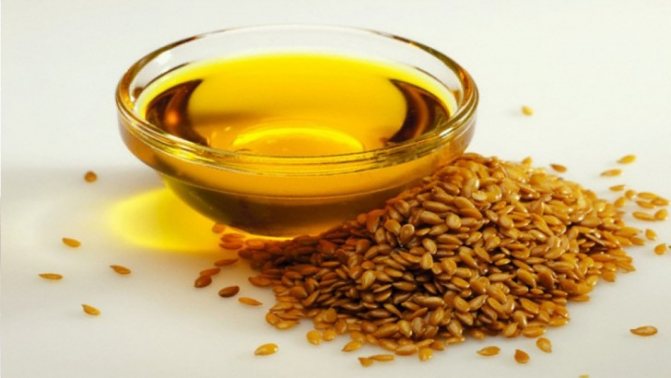
data-matched-content-rows-num=”9, 3″ data-matched-content-columns-num=”1, 2″ data-matched-content-ui-type=”image_stacked”
During pregnancy and breastfeeding, every woman tries to give her baby all the most valuable things. Young mothers begin to eat various new foods, which, in their opinion, are rich in vitamins and are very beneficial for the child. However, not all products are suitable for pregnant and breastfeeding women. One such unnecessary food additive is flaxseed oil.
Compound
Flaxseed oil actually contains many vitamins and microelements. The high content of the Omega-3 element makes this product indispensable for people suffering from cardiovascular diseases. Flax oil also prevents the formation of cholesterol plaques, thins the blood and improves digestion.
Nutritionists say that regular consumption of flaxseed oil can be an excellent prevention of hypertension, inflammatory diseases of the genitourinary system, breast cancer and many other women's diseases.
The use of flaxseed oil is not recommended in combination with blood thinning medications. The simultaneous use of anticoagulants and flax products can cause internal bleeding.
The product must be stored in a dark, cool place.
Pregnancy
Based on the results of numerous studies, experts in the field of gynecology and obstetrics have come to the conclusion that pregnant women are highly discouraged from consuming flax products. The components contained in flax oil can provoke premature birth. For this reason, doctors advise not to take this product for the entire period of pregnancy.
Lactation
To date, there is no specific ban on the use of flaxseed oil during breastfeeding. However, after studying the composition of the product, many doctors came to the conclusion that during lactation it is better not to overuse flax seeds.
Of course, flaxseeds are very healthy, but they contain components that are difficult for children to digest. For this reason, the baby may experience an upset stomach. It is especially not recommended to use the product in the first weeks after childbirth. At this time, the woman still experiences bleeding, and flax seeds can aggravate it.
It is known that flaxseed oil has a strong effect on the production of certain hormones in a woman’s body. But since during lactation the hormonal background is responsible not only for breast milk, but also for the mother’s contraception, it is better to refrain from flax products for the entire period of breastfeeding.
Cosmetology
If you have a supply of flax oil, and after reading the previous material, you decide to throw it away, don’t rush! Oil can be very useful for every woman during lactation.
As a result of pregnancy and childbirth, many women lose large amounts of vitamins. Vitamin deficiency can turn a beautiful young woman into a drooping and withered rose. Due to the lack of nutrients, hair, nails and skin suffer. The face loses its healthy glow, turns gray and sags. Hair begins to gradually fall out, split ends and break.
Considering the fact that nursing mothers are prohibited from using any cosmetic products, flaxseed oil can be a real salvation.
We suggest you read: Can breast milk be unsuitable for a baby?
It is the hands that age first in women. The use of hand creams and lotions during breastfeeding is not recommended. Fragrance and chemical components can cause an allergic reaction in an infant. Flax oil as a hand cream is absolutely safe and most effective.
Weleda oil
The German company Weleda has proposed a line of products that will become indispensable attributes. Many women noted that Weleda not only helps improve lactation properties, but also provides high-quality breast care.

Weleda products are a storehouse of valuable substances that a woman may need during breastfeeding. Like castor oil, it helps improve blood circulation.
The product is a mixture of beneficial essential oils that provide proper care. The line from Weleda fights stretch marks, improves lactation and promotes good milk production. Regarding the Weleda line of products, there are many rave reviews on the Internet from young mothers who tried to use it and were satisfied. In addition, Weleda has proven itself as a means to stop congestion in the chest.
Thus, flaxseed oil is a controversial product; only the mother makes the decision about whether it is worth consuming. Before taking it, in any case, you should consult a doctor and listen to his advice. Other oils - castor, Weleda and so on - are used in the same way - on the recommendation of a doctor.
Is it possible to eat or drink flax seeds while breastfeeding and in what form?
Doctors and lactation consultants do not have a consensus on the possibility of using flaxseeds for breastfeeding. Some believe that the harmful properties of the product are too great and such use is unsafe. The majority is inclined to think that the benefits significantly outweigh the harm, and side effects are quite rare, so the product can be eaten. It is better to consult with a specialist regarding the possibility of using flax in your case.
In the first month
It is recommended to introduce the product into the diet for the first time 3 months after birth, but it is also allowed when the baby is one month old. The child’s body will become strong enough to accept new products on the mother’s menu.
Doctor Komarovsky's opinion
Komarovsky speaks well of the benefits of flaxseed oil in the fight against constipation and helminths in children on breastfeeding. In addition, he talks about the benefits of flax for the prevention and control of rickets. Since flaxseeds have the same properties as oil, by analogy we can assume that they are no less useful for children during breastfeeding.
Oil
Flax seed oil is similar in composition to flax seeds. This is a concentrate of the useful substances of the product. Flaxseed oil is allowed for breastfeeding. It is much more effective than seeds in treating constipation. It is recommended to start using ½-¼ teaspoon per day. If there is no reaction, the dosage can be increased. The maximum dose is 2 tablespoons per day. Due to the unstable concentration of ligans in the oil, it is impossible to determine the exact dosage, and excessive use can lead to adverse reactions, so be sure to consult a doctor before taking it.
Read more in the article “Flaxseed oil for breastfeeding.”
Flaxseed flour
Flaxseed flour has recently been increasingly used in cooking. If you want to use it in baking, remember: flaxseed flour is used as an additive to wheat, oatmeal and other types of products. Its composition is too active for independent use, especially for nursing women.
You can buy it in a store or pharmacy, but the healthiest one is the one you prepare yourself. To do this, take flax seeds and mash them in a mortar. You can use a blender or coffee grinder, but the product reacts with the metal, which can give the flour a distinct flavor. It is best to use this flour immediately after production.
Flaxseed flour with kefir
Flaxseed flour is most often used by women for weight loss. A 3-week course to lose excess weight is recommended. It should be noted that for maximum effect you need to give up unhealthy foods, fried foods, flour products and drink a lot of clean water. The diet is based only on flour and kefir, so it is perfect for women who have gained extra pounds during pregnancy.
So, for 3 weeks you need to drink the following drink.
Compound:
- Flaxseed flour.
- Kefir.
Preparation:
Mix kefir with flour.
Proportions:
1 week - 1 teaspoon of flour per 100 ml of kefir.
Week 2 - 1 tablespoon of flour per 100 ml of kefir.
Week 3 - 3 tablespoons of flour per 200 ml of kefir.
Application: Drink the mixture cold in the morning on an empty stomach every day. You can't heat flax.
Urbech
It is recommended to use flaxseed urbech for breastfeeding from the age of 3 months. This product is rich in vitamins and minerals. If there is no allergy, it will help cope with many breastfeeding problems, including hypolactation. Flaxseed paste is believed to help increase the quantity and nutritional value of breast milk.
It is possible to prepare flax urbech at home yourself; read more about this in the article “How to prepare urbech from flax seeds at home?”
Decoction
It is recommended to drink a decoction of flax seeds for diseases of internal organs, especially the gastrointestinal tract. The second name of the drink is flaxseed jelly.
Compound:
- Flax seeds - 2 tsp.
- Boiling water - 1 glass.
Preparation:
- Pour boiling water over the seeds in a thermos.
- Let stand for 2 hours.
- Strain.
Application: Drink the liquid freshly prepared. Do not store the decoction for more than 2 days. During breastfeeding, it is forbidden to drink more than half a glass a day.
Porridge
Flaxseed porridge during breastfeeding is very beneficial for the body. Remember that multi-component dishes can be eaten by nursing women only after introducing the components separately into the diet.
For more information about the benefits of flax porridge for mothers and babies, read the article “Flax porridge during breastfeeding
You can prepare flaxseed porridge at home using the following recipes:
- Flax porridge with banana for nursing mothers.
- Flaxseed porridge with dates for breastfeeding mothers.
Benefits of flax for mother and child
Selection and storage
Flax oil contains unsaturated fatty acids (Omega-3 and Omega-6). According to some experts, the influence of these components on brain activity passes on to the child, accelerating the development of his brain. This information has not been confirmed, but is presented in many circles as reliable. Unsaturated acids are not produced in the body independently; in addition to flax, they can be obtained from sea fish (salmon, mackerel, etc.) and algae.
If you take flax seeds while breastfeeding, the nursing mother's body is saturated with vitamins A, B, C, E and F. Their use has a positive effect on the condition of hair, nails, facial skin and body.
There is also an opinion that flaxseed oil should not be taken not only during lactation, but also earlier, in the 1st and 3rd trimester of pregnancy.
During breastfeeding, a woman’s body needs additional vitamins and microelements. When used correctly, flax can become a source of such substances for a nursing mother. It has the following effects on the body:
- prevents viral and bacterial infections;
- normalizes the functioning of housing and communal services, eliminates constipation;
- restores the menstrual cycle, which often leads to unplanned pregnancy;
- eliminates postpartum encephalopathy;
- heals skin and hair;
- Helps reduce stretch marks.

Flax seeds and products made from it can support women's health and beauty during breastfeeding, improve lactation, and promote the development of the baby's brain - say modern breastfeeding experts feeding. However, pediatricians warn about negative consequences for the baby - the likelihood of digestive disorders.
Product benefits
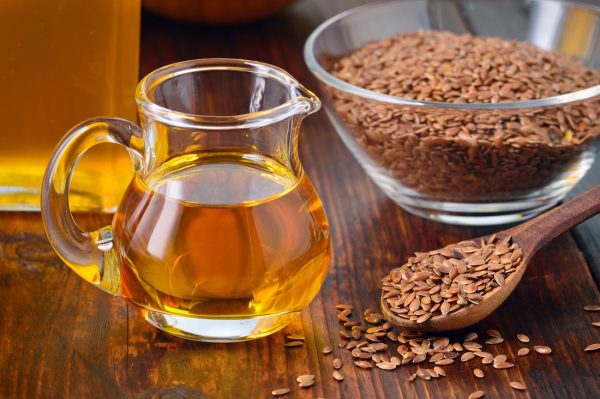
Only natural flax products - fresh seeds, natural cold-pressed oil - can bring benefits to the mother and baby's body. Taking capsules, dietary supplements and other preparations containing flax extract or oil during breastfeeding is undesirable due to the presence of excipients in the composition. With proper use of a natural product, it can bring tangible benefits to the body:
- normalizes the functioning of the gastrointestinal tract;
- helps cope with constipation;
- stabilizes female hormonal levels;
- helps in the fight against viral, fungal, bacterial diseases;
- prevents the development of breast cancer;
- improves the condition of skin and hair;
- promotes the functioning of the thyroid gland;
- increases immunity;
- prevents problems in the functioning of the kidneys, liver and heart.
It is difficult to overestimate the positive effect of omega fatty acids in flax on the development of the infant’s brain. The beneficial components contained in flax seeds and oil enter the child’s body along with the mother’s breast milk, contributing not only to the intellectual, but also to the physical development of the baby.
Flaxseed is also taken as a lactation stimulant. It is known that plant analogues of female hormones can increase the volume of breast milk, but this effect is individual. Phytoestrogens also enhance the production of the hormones oxytocin and progesterone, which leads to rapid restoration of the menstrual cycle after childbirth and prepares the body for the next pregnancy.
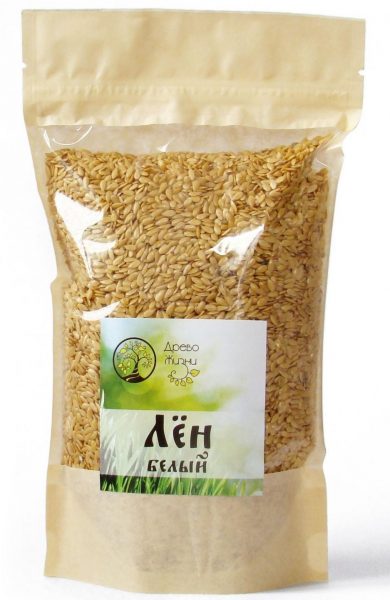
Flax seeds can be light or dark brown, depending on the variety
If you decide to include flaxseed, flour or oil in your diet, you should consult your doctor. This product is classified as a drug, so its uncontrolled use can be dangerous for mother and baby. The child may experience negative reactions: allergies or digestive disorders.
Flax seed is classified as a low-allergenic product, but cases of individual intolerance, especially in early childhood, cannot be ruled out. In some cases, flax in the diet of a nursing mother causes increased colic in the newborn, increased gas formation, and even diarrhea in the baby. Do not forget about the laxative properties of flax, which also extend to the woman herself.
Contraindications to the use of flax are:
- high blood pressure;
- endometritis or uterine fibroids;
- pancreatitis;
- diseases of the gallbladder and biliary tract;
- kidney pathologies;
- stomach ulcer and inflammatory processes of the gastrointestinal tract.
An overdose of the product can lead to diarrhea and digestive disorders. Neglecting contraindications is fraught with aggravation of existing diseases and deterioration of well-being.
Do not consume flaxseed oil on an empty stomach while breastfeeding. It is best to add it to salads or other dishes. Do not use this product for frying. Such processing destroys all beneficial substances and makes the product harmful to health. Drink 1 teaspoon of oil in the morning and evening. This scheme will allow you to get the maximum benefit from using the product.
DETAILS: Sea buckthorn oil in gynecology use
In capsules
Flax oil in capsules is suitable for those who do not want to adjust the dosage. The recommended daily dose is 1–6 capsules. The exact dosage can be found in the description on the package. It depends on the packaging of the product. Manufacturers recommend starting use with a minimum amount, gradually increasing it in the absence of adverse reactions in mother and baby.
For weight loss
Most girls know flaxseed oil as a means of losing weight. If you want to lose weight, drink a teaspoon of oil on an empty stomach in the morning. After 20 minutes, start breakfast. In the evening, drink another teaspoon of the product, but 20 minutes after eating or before bed. Over time, you can increase the single serving to 1 tablespoon.
If, when using the oil in this way, you begin to worry about problems with stool, drink 200 g of warm clean water a few minutes after the oil. This minimizes the gastrointestinal reaction. If you are afraid to drink oil on an empty stomach, you can add it to various dishes without heat treatment. The effect will not be as fast, but noticeable.
You can take flaxseed oil with honey or sweeteners. Remember, any additives, especially honey, increase the risk of developing allergies in a nursing mother and child. The effect of regular use of the product will be noticeable after a few months. If you simultaneously give up unhealthy foods, fried, sweet, starchy foods, the results will be faster and more noticeable.
Losing weight while breastfeeding is real: proper nutrition and exercise will bring you closer to your ideal figure.
For constipation
People prone to constipation are advised to take flaxseed oil as an alternative to laxatives. It helps dissolve food and move it through the gastrointestinal tract. It is best to take the oil for constipation in the morning 30 minutes before meals and in the evening before bed. But since it has a very specific taste, many cannot bring themselves to drink it in its pure form.
There are alternatives for such people. You can add it as a salad dressing. Or mix with milk in proportions 1:2 before going to bed. You can also mix the product with honey or natural yogurt and drink it before bed. Flaxseed oil is often used to treat constipation in children. It can be given from six months. The dosage is calculated as follows: 1 drop of oil for every month of life.
How to select, prepare and store
It is important to choose only a high-quality natural product and follow storage rules, as flax quickly deteriorates. Choose flaxseed oil only in dark glass containers
This product can be stored for more than three months. If you use seeds, grind the whole grains in a coffee grinder or meat grinder and add them to the finished, non-hot dish. You can buy already ground grains.
You can also make a decoction from the seeds. To do this, pour a liter of water, two tablespoons of seeds and heat in a water bath for two hours. Or pour the grains into a thermos, pour boiling water over them and leave for an hour. This drink strengthens the immune system, helps with colds, diseases of the stomach, liver and kidneys, and with constipation. It invigorates, energizes and tones the body, and has a positive effect on lactation.
Flaxseed oil is stored in a tightly closed container only in the refrigerator. Seeds are stored in glass and tightly closed packaging in a dark and well-ventilated area. Choose only fresh products, be sure to study the composition and check the expiration date!
Harm
Consumption of flax seeds, oils and decoctions has an effect not only beneficial
The product should be consumed with caution, as flax brings both positive and negative results. If a woman has not consumed this product in her diet, then before introducing it, you should consult with your doctor (gynecologist) and pediatrician to find out about its significance for the child.
Negative effects of the product:
- For the mother - when suffering from diseases of the reproductive tract, you should not eat flax products, so as not to provoke the growth of tumors. For gastrointestinal diseases, flax seed and oil will provoke disorders and intestinal pain. Consumption can lead to inflammation of the gallbladder and kidneys.
- For infants, just like for women, there are contraindications for diseases of the gastrointestinal tract, kidneys and gall bladder. If there is an allergic reaction to the product (rash, upset), then you should discard it. If in excess, it causes intestinal upset.
When and why should a nursing mother not use flaxseed oil?
Flaxseed oil is very beneficial for the body and there are no categorical contraindications to its use. There are a number of restrictions, but in any case you should consult your doctor. It is not recommended to use flaxseed oil simultaneously with blood thinners or if you have problems with blood clotting, as there is a risk of bleeding.
It is better to avoid the product for people with hepatitis. In addition, there are restrictions when undergoing antiviral therapy, taking antidepressants and hormonal treatment.

If you or your baby has diarrhea, it is most likely from flaxseed oil. Give up flax oil for a while and when your stool returns to normal, return it to your diet, but in smaller quantities.
Side effects include bloating, allergies, and loose stools. This rarely happens in adults, so it does not limit oil intake
You need to be careful with breastfeeding. Use oil only according to the rules and do not exceed the recommended norms
Side effects in children occur much more often due to their fragile bodies. In addition, it must be taken into account that the shelf life of oil, especially open oil, is very short; it oxidizes quickly. Therefore, you should not buy it in large quantities.
Is an allergy possible?
Flax oil is not a strong allergen, but, like any product, it can cause an allergic reaction in both a nursing woman and a child. The baby’s body sometimes reacts incorrectly to substances that enter its body. An allergy can manifest itself in the form of a rash, cough, swelling, heavy breathing, redness on the skin, etc. If you notice such symptoms in your baby, stop taking it immediately and consult a doctor.
Is it possible for a nursing mother to take flaxseed oil?
Regardless of how many beneficial elements a flax derivative contains, it can cause harm to the body. Its value is determined by the conditions under which the flax derivative is taken. A number of possible complications and contraindications that must be taken into account if you plan to breastfeed and at the same time use a herbal supplement:
- It is forbidden to take it after a caesarean section.
- Flax seed during breastfeeding can cause bleeding, but this is only possible if taken immediately after childbirth.
- If you take capsules for a certain period of time after childbirth, there is a risk of hormonal changes.
- Taking the product sometimes provokes bowel dysfunction (diarrhea).
- Individual intolerance may occur, so before breastfeeding a child and at the same time drinking flaxseed oil, you need to check whether there are allergic reactions to it.
- Given the harm that this supplement can cause to the body if used incorrectly, it is recommended to visit a doctor before taking it. However, it is forbidden to drink flaxseed vegetable oil during breastfeeding if the following diseases have been detected: pancreatitis, polycystic disease, endometritis and fibroma, colitis, hypertension.
Article on the topic: On the causes, treatment and consequences of muscle hypertonicity
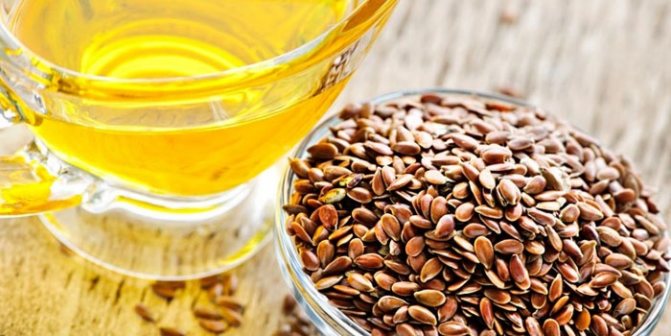
Is it possible to drink or eat flaxseed oil during breastfeeding?
Since the nutrition of a nursing mother affects the composition of breast milk, and its components can pass into the baby, it is important to responsibly choose products. Flaxseed oil has an active composition, so it enters the baby’s body during feeding
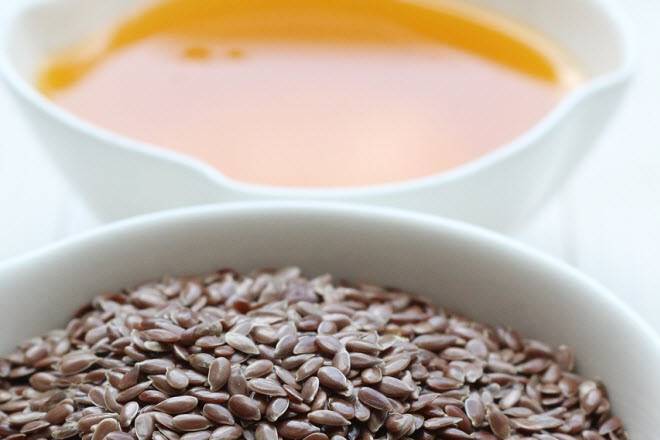
Flaxseed oil is a valuable natural product that helps relieve constipation and has other beneficial properties.
The use of this product by a nursing woman is permitted. It has a beneficial effect not only on the mother’s body, but also on the baby
It is important to include it correctly in the diet. It contains substances that are difficult to digest, so excessive amounts can negatively affect the body of a small child.
The difficulty in using flax oil for breastfeeding is that it is impossible to know exactly how many ligans are contained in 1 ml, so the dosage cannot be determined. If you are afraid of not calculating the dose, seeds are an alternative when breastfeeding. Ligans are biologically active components that quickly and in large quantities penetrate into breast milk and are excreted from it in about a week. Therefore, in the event of an allergy or other negative reaction in the baby, it will be difficult to organize feeding during the hatching period.
At 1 month
For safe use, consult your physician before use. In the first weeks after childbirth, it is strictly forbidden to include the product in the diet, as it can cause increased bleeding, so it is recommended to start from 3-4 weeks, when the discharge is almost over. On the contrary, flax seeds for breastfeeding are allowed from birth. The first time, do not drink more than ¼-½ teaspoon of oil. After this, monitor for several days to see if your baby has any negative reactions. If you do not notice problems, you can gradually increase the dosage. The maximum daily dose is 2 tablespoons.
Doctor Komarovsky's opinion
Dr. Komarovsky is a reputable doctor whose opinion is listened to by young mothers. He spoke well more than once about the benefits of liquid vegetable oils during breastfeeding. Flaxseed oil is rich in vitamin D, which is passed on to the baby through milk. This is useful for the prevention of rickets in children. In addition, Komarovsky speaks well of the benefits of the product in the fight against helminths.
Flaxseed oil during breastfeeding
Flaxseed oil is obtained by pressing flax seeds. It has an unusual, unique taste and aroma. A slight bitterness gives dishes with its addition a special piquancy. Most often, this oil is used as a dietary supplement to food. You can purchase flax products both at a pharmacy and in a regular store.
Flaxseed oil is extracted using cold and hot methods. In the first option, the resulting product is as useful as possible. Cold pressed oil has a light golden color. This is what we see on store shelves and in pharmacies.
And when extracted using a hot method, linseed oil becomes dark and acquires a strong odor. The result is drying oil (paint and varnish material for wood processing). It is dangerous to consume hot pressed oil.
Flaxseed oil can only be stored in the refrigerator.

Flaxseed oil is most often used as a dietary supplement.
Composition and benefits of flaxseed oil
The chemical composition of flaxseed oil is simply impressive in the amount of vitamins, micro- and macroelements.
It contains minerals such as:
- potassium;
- calcium;
- magnesium;
- zinc;
- selenium;
- copper;
- manganese;
- iron;
- phosphorus;
- sodium.
In addition to these components, flaxseed oil is rich in fatty acids, such as:
- alpha-linoleic acid (Omega-3);
- linoleic acid (Omega-6);
- oleic acid (Omega-9);
- saturated fatty acids.
In terms of fatty acid content, flax oil is superior to fish oil.
Flax seed oil also contains vitamins B4, E, A, K. Vitamin B4, or choline, lowers cholesterol, protects cells from damage, increases the body's resistance to stress, and is involved in normalizing metabolism. Vitamin E is a very strong antioxidant that slows down aging. In addition, tocopherol (another name for vitamin E) helps:
- make blood vessels strong;
- replenish the lack of oxygen in the body;
- increase performance;
- reduce blood pressure;
- speed up the healing process of minor wounds and cuts;
- strengthen the immune system;
- It is better to absorb vitamin A, which is also found in flaxseed oil.
In wider circles, the role of vitamin A as a substance that can maintain eye health is better known. But besides this, retinol:
- participates in the process of protein synthesis;
- normalizes metabolism;
- strengthens the immune system;
- fights viruses;
- accelerates the healing of damaged tissues;
- has a beneficial effect on the condition of the skin, hair, and nails.
The combination of all components in flaxseed oil makes it incredibly beneficial for the body. Regular use of this product can:
- reduce weight;
- improve the cardiovascular system;
- normalize the functioning of the gastrointestinal tract;
- help prevent inflammatory processes in the body;
- improve the condition of hair, nails, skin;
- normalize hormonal levels in women;
- have a preventive effect against tumors;
- increase immunity and stress resistance.

Regular consumption of flaxseed oil promotes weight loss
Video: benefits of flaxseed oil
Restrictions on the use of flaxseed oil
A number of countries have banned the sale of flaxseed oil. This is due to the fact that if it is not stored and consumed correctly, it can cause significant harm to health.
Flaxseed oil is slightly bitter, unlike sunflower oil. But if the bitterness is strong, then the oil is spoiled as a result of improper storage. This product should not be used.
Among the contraindications for consuming flax seed oil:
- gallstone disease in a state of exacerbation;
- chronic pancreatitis;
- hepatitis;
- stomach ulcer, gastritis;
- polyps in the uterus and appendages;
- increased acidity of gastric juice;
- increased blood clotting.
Individual intolerance to the product is possible, which manifests itself in the form of diarrhea and allergies.
Pregnant women and people taking medications should use flaxseed oil very carefully:
- cholesterol lowering;
- affecting blood clotting;
- painkillers;
- antidepressants;
- antidiabetic;
- contraceptives and hormonal drugs.
Flaxseed oil becomes carcinogenic when exposed to oxygen and heat.
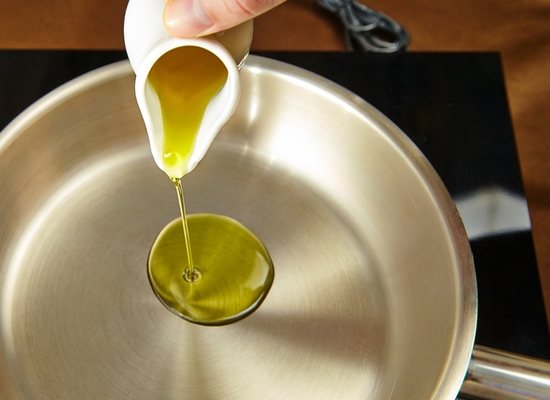
Flaxseed oil should not be used for frying
Why is flaxseed oil dangerous when breastfeeding?
Flaxseed oil contains many lignans (plant analogues of estrogen), which have a significant effect on the woman's body. Scientists suggest an adverse effect on infants, female adolescents and women with normal hormonal levels .
On the other hand, consuming flaxseed oil increases the concentration of fatty acids in milk. Despite the fact that the benefits of the product for the body are undeniable, many doctors still do not recommend breastfeeding women take it for the following reasons:
- Natural bleeding after childbirth may increase. In this regard, it is prohibited for women to use it after a caesarean section;
- natural contraception may be disrupted during breastfeeding;
- the baby’s digestion may not be ready to absorb fats from this product;
- flaxseed oil may adversely affect the development of the reproductive system of infants.
It is best to discuss the introduction of flaxseed oil into a nursing mother’s diet with your doctor.
Is it possible for a child?
If there are no contraindications or allergies, then you can add flax seeds and its derivatives to your child’s food.
Important! Use them in very small quantities. Beneficial properties have a beneficial effect on intestinal motility, improve immunity, and have a preventive effect on rickets
From what age?
After the period of colic has passed, flax seeds and its derivatives can be introduced into complementary foods. From six months - 5 grams of seeds in vegetable porridge, from one year to three years - 0.5 teaspoon per day. From three years old, increase to one teaspoon.
How to add it to food?
It is easiest to use flaxseed oil in complementary feeding, but this must be done with care (it can increase bile secretions and cause colic in the gallbladder area). It is best to grind the seeds and add them to vegetable porridge instead of regular vegetable oil.
At the same time, it is important to limit its consumption by the mother, because with milk she also receives flax microelements. Then it’s worth making a distinction and choosing whether to get nutrients from milk or feed
How are they useful?
Flax is useful in a child’s diet for the prevention of rickets and arthritis. Helps cope with inflammatory processes by reducing the production of prostaglandids. Omega acids are important in building the baby’s skeleton and teething.
Also, the beneficial substances of flax have a preventive effect against inflammatory diseases of the respiratory tract (asthma, bronchitis)
Some researchers recognize another important property - protection against intestinal cancer. And most importantly, it has an effect on the gastrointestinal tract and improves peristalsis.
Is it allowed to give it to a child?
Ideally, a woman should breastfeed her baby for the first 6 months. After this time, complementary feeding is mandatory. If we talk about flaxseed oil, it is just as beneficial for a child to consume as it is for a mother.
At what age should it be included in complementary foods?
From the age of six months, the baby begins to eat food independently. For maximum benefits of flax oil, it should be introduced into the child’s diet from this age.
In this case, the maximum amount of this product per day should be about 12-15 drops.
For maximum comfort for the baby, flaxseed oil must be added to breast milk. You can also season vegetable soup with a small amount of this product.
How is it beneficial for a baby?
Fatty acids and other beneficial substances contained in the oil have the following effect on the child’s body :
- improve growth and development at the cellular level;
- increase protective functions to the effects of adverse factors;
- help the cerebral cortex develop fully;
- have a beneficial effect on the visual apparatus;
- promote the proper formation of bone tissue;
- increase appetite;
- normalize tone.
Reference. Regular consumption of oil also helps improve the functioning of the musculoskeletal system and prevents constipation and other intestinal problems.
Usage
Flax seeds are used both whole and in crushed form.
- Decoction is very popular; according to the recipe, 20 grams are simmered in a liter of water for about 3-4 hours. Drink 150 grams twice a day, but not on an empty stomach in the morning.
- Seasoning – seeds perfectly change the taste of dishes. They are added to porridges and salads, sprinkled on baked goods, mixed into yoghurts or ready-made hot dishes.
- An independent supplement - simply drink the crushed seeds with warm water or pour them into a glass. They snack on kefir in the evening. This is about 30 or 40 grams of seeds.
Flax is a unique plant. Its seeds and oil are simply a storehouse of beneficial properties. It is not for nothing that in the old days women and girls recognized it as an elixir of beauty - after all, its consumption is not limited to food. It makes excellent masks for hair and hands. During breastfeeding, flax seeds help cope with many problems, and also normalize the functioning of the body: for the mother it is restoration, for the baby it is activation of development and protection.
Types of fish oil
There are two ways to obtain it.
- Most often, fish oil is obtained by pressing the liver of fish. This product contains up to 20% omega-3 acids and many vitamins A, E, D, but pregnant women should not get carried away with it. Excessive amounts of vitamin A negatively affect fetal development
- Currently, they have learned to extract it from the pulp of fish living in the waters of the Arctic and North Atlantic. This kind of fat is called fish oil. It contains the largest amount of omega-3 and is suitable for both pregnant and lactating women. Many manufacturers take a responsible approach to production and additionally subject fish oil to thorough purification from impurities. This affects the final cost of the product, but quality is more expensive
Use during pregnancy
It is impossible to overestimate the importance of sufficient intake of polyunsaturated fatty acids (PUFAs). During pregnancy, they have great benefits for the development of the fetus. EPA and DHA acids (see explanation below) are critical for the development of the brain and retina. Studies have shown that children of mothers who received sufficient amounts of omega-3 during pregnancy have better cognitive abilities and have sharper vision.
We suggest you read: Discharge during ovulation - what are they?
What are the benefits of flax?
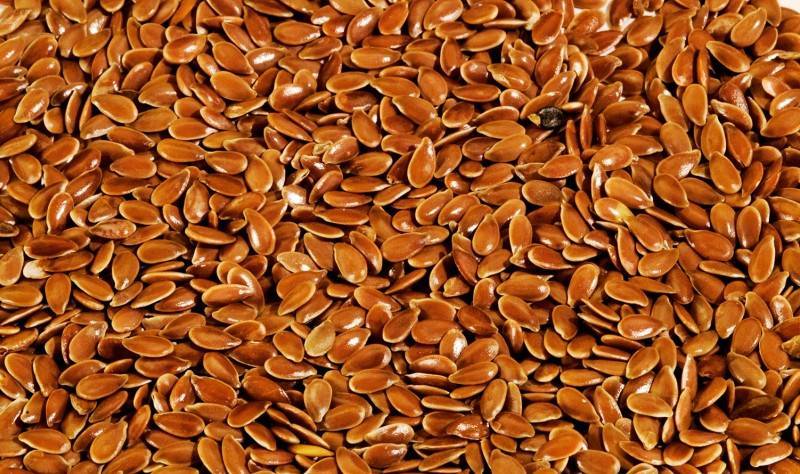
This plant, or rather its seeds, help the body more actively eliminate;
- toxins;
- various parasites;
- waste products of microorganisms.
At the same time, dietary fiber ensures the binding and removal of heavy metals. At the same time, flaxseed oil contains much more omega-3 fatty acids than the fish oil we have known since childhood.
These substances are essential for a child to fully develop. They also guarantee the normal functioning of the blood vessels of a nursing mother.
The above-mentioned omega-3 acids can make the blood thinner, which allows for effective prevention:
- atherosclerosis;
- thrombosis;
- many heart diseases.
At the same time, omega-6 acids are found in large quantities in meat and animal fats. Abuse of them leads to rapid weight gain and also contributes to the development of:
- heart attack;
- diabetes mellitus
They also lead to an increase in the amount of bad cholesterol. But the harm is completely eliminated by the presence of omega-3 in flax seeds.
This product also contains selenium in large quantities, a deficiency of which is observed in almost all residents of large populated areas. Its deficiency can lead to cancer.
The seeds are also rich in potassium. It allows proper metabolism at the cellular level. Without him:
- heart rhythm is disrupted;
- swelling occurs;
- kidneys hurt.
At the same time, flaxseed contains potassium in much larger quantities than, for example, bananas. In addition, they also contain lecithin and B vitamins. These useful elements provide protection to nerve cells and prevent the occurrence of mental illnesses and depression.
Fish as a source of omega-3
Fish oil was used back in Soviet times and was given to all children without exception. It contains the essential DHA and EPA. Over time, its popularity waned. Previously, after pressing, the oil was bottled. In this form, fish oil quickly oxidizes and goes rancid, negating all the benefits.
The issue of covering the need is partially resolved if a person regularly feasts on fatty varieties of sea fish. But a problem arises because the prices for good goods are off the charts. Not everyone can afford to use it frequently. Most of the fish sold are no longer caught in the oceans, but are grown in artificial conditions. Such products contain almost no omega-3 acids.
In addition, marine fish species are capable of accumulating mercury and heavy metal salts. Such products are not best suited for pregnant and lactating women.
Is it possible to have flax seeds during breastfeeding?
Expert opinions on the effect of oil seeds on nursing women vary. No one denies the beneficial qualities of the plant, but for a mother whose child is fed breast milk, it is better to consult with her doctor on this issue. The only thing doctors unanimously say is that flax seeds during breastfeeding should be used natural and, preferably, home-made.
Useful qualities of seeds
The general healing effect of flax seeds has a positive effect on a woman’s appearance and body. The use of flax seeds by nursing women can speed up the recovery process after pregnancy and childbirth. The seeds contain many minerals, vitamins, up to 45% oil and important microelements. Exploring their medicinal properties, it was noted:
- Preventive effect against colds, general strengthening of the immune system.
- The ability to normalize hormonal levels.
- Beneficial effect on gastrointestinal function. Improved metabolism. Taking the seeds helps women who have given birth get rid of constipation.
- The seeds help restore healthy skin and hair.
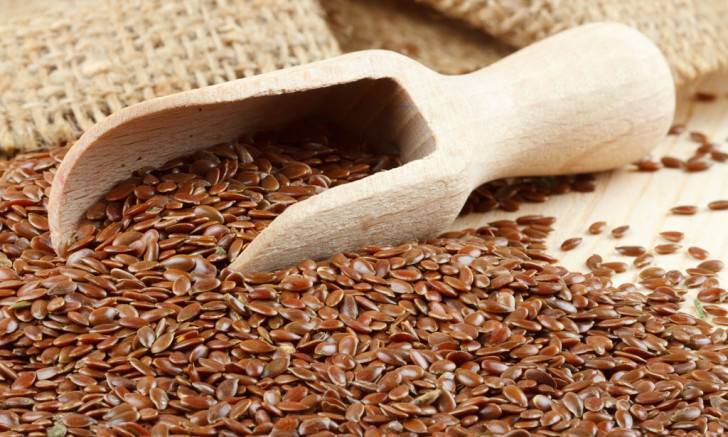
Flax seeds will help a woman recover faster after childbirth
When is flax seed intake indicated?
While studying the effect of flax seeds on a woman’s body during breastfeeding, doctors noticed positive trends associated with their medicinal properties. Experts have pointed out a number of health problems for which taking flaxseed during lactation is simply necessary. Doctors refer to them as:
- disorders of the kidneys;
- diseases of the liver and cardiovascular system;
- digestive problems.
If you consume the seeds in a certain dosage and strictly as recommended by your doctor, you can rid your body of waste and toxins. The vitamins that come from the seeds consumed by the mother in the milk supply the baby’s body with a complete vitamin complex.
When a doctor recommends that you stop eating plant seeds, you should listen to him. The reason may be a general intolerance of the product by the female or child's body. If you notice a rash on your child’s skin after eating the seeds, stop taking them immediately.
Who is contraindicated for taking seeds?
Having considered the positive factors, let’s dwell on the prohibitions. While flaxseed helps cure some diseases, it has a negative effect on others. A woman needs to know about this if she has not yet consulted with her doctor. Doctors note that a nursing mother should not eat flax seeds if she has the following diseases:
- uterine fibroids;
- pancreatitis and other inflammatory processes in the stomach;
- arterial hypertension of various stages.
https://youtube.com/watch?v=95z_5BcTKeI
A negative reaction of the body to a product is often associated not so much with its dangerous qualities, but with excessive consumption. The statement is also true for the plant we are considering. If you take an overdose of flax seed, you may encounter unpleasant consequences, even without suffering from the listed diseases.
How to properly prepare and use?
For proper preparation, you need to soak 1.5 teaspoons of seeds in warm water and wait until a mucous structure forms. Drink the seeds 30 minutes before meals in a dosage of ¼ cup. The resulting mucus can be used for compresses and lotions. In addition, judging by the reviews, flaxseed is added to baked goods, and salads and cereals are prepared with it. Choose an acceptable method for yourself and be sure to follow the dosage of the product.
Contraindications and existing restrictions
When understanding the question of whether flaxseed oil can be consumed while breastfeeding, you should consider the harms and contraindications of the product.
Here are the following contraindications:
- the presence of polycystic diseases, uterine fibroids, endometritis and other pathologies of the reproductive system;
- intestinal inflammation;
- pathologies of the biliary tract;
- pancreatitis;
- hypertension.
DETAILS: How many drops of valerian to calm down. How many valerian tablets can you take at a time to calm down and sleep well?
It should also be noted that during breastfeeding it is important for a woman to take not flax oil, but the Omega-3 fatty amino acid. It can be found in other products if flaxseed oil is prohibited by GW. Omega-3 is found in fish and seaweed, as well as pumpkin seeds and walnuts, beans and legumes.
Unfortunately, there is no clear answer to the question of whether a nursing mother can take flaxseed oil. The fact is that there are certain risks associated with the use of this product. For example, oil quickly oxidizes when in contact with air and releases peroxides (fat oxidation products), which does more harm to humans than good. In France, its sale is prohibited precisely for this reason.
You can supplement your ideas about the benefits and harms of flaxseed oil in a separate material.
On the one hand, flax seed is beneficial, but on the other, it can cause harm. All existing prohibitions on the use of oil should be carefully studied, and if they exist, its use should be abandoned. It cannot be used in the following cases:
- The presence of a number of female diseases. This applies to polycystic disease, uterine fibroids, and other conditions.
- The presence of inflammatory and erosive processes in the intestines.
- Conditions associated with pancreatitis and inflammatory diseases of the bile ducts.
- Persistent increase in blood pressure.
If such conditions exist, then flaxseed oil cannot be used. Don't be upset about this. Omega-3 complex can be obtained by consuming other foods. This may include fatty fish, seaweed, and other foods.
You can't overuse oil. Otherwise, you may be rewarded with digestive tract disorders. There may be an exacerbation of chronic pathology or a decrease in the effectiveness of therapy for many diseases.
Is it possible to have sauerkraut while breastfeeding?
Breastfeeding specialists recommend that young mothers gradually introduce flax into their diet, as it restores the female body after childbirth, prevents its exhaustion during breastfeeding and improves immunity.
This useful product is also credited with the ability to improve lactation. This property is due to the fact that flax seed contains many phytoestrogens. Its use increases breast milk volume by up to 40%. Experts also claim that the product has a positive effect on the quality of milk.
If flax is consumed immediately after a cesarean section, it can cause bleeding in a woman. If the product is abused, mother and child may experience digestive disorders.

There are a number of diseases in which flax is contraindicated for a nursing mother, despite all its beneficial properties. In order not to provoke an exacerbation of the condition, flax products will have to be excluded from the diet if the woman has a history of the following diseases:
- endometritis;
- uterine fibroid;
- polycystic disease;
- diarrhea;
- hypertension;
- hypertension;
- housing and communal services diseases;
- cholelithiasis.
Prepared medicinal preparations cannot be stored for a long time. Therefore, it is better to cook them little by little and take them fresh. To get the maximum benefit from flaxseed products, a nursing mother should definitely consult a doctor and strictly follow all recommended dosages.
Beneficial features
Flaxseed oil is considered especially beneficial for the female body. This is due to its composition, which contains unsaturated fatty acids Omega 3, Omega 6 and Omega 9. Moreover, the first component is not synthesized by the human body, so it must be supplied with food in the required dosage. In addition, the oil contains antioxidants (vitamins E and C).
These fatty acids, like all fats, act as a source of energy and also serve as “building material” for cell membranes and membranes, promoting the mobility and necessary permeability of the latter. In addition, Omega 3 helps normalize cholesterol levels and prevents the formation of cholesterol plaques on the walls of blood vessels.

Of course, such an effect is beneficial for every person, but it is especially valuable for the body of a pregnant woman. During this period, the blood may already have a higher viscosity, which makes it difficult to pass through the vessels. The presence of obstacles in the form of plaques will only aggravate the situation and may result in insufficient saturation of the tissues of the mother and fetus with oxygen and beneficial elements.
Deficiency itself leads to the clumping of blood cells (red blood cells). As a result, blood viscosity increases and, as a result, the risk of developing thrombosis. Thus, one of the beneficial functions of flax seed oil during pregnancy is improving blood flow in a woman’s body, as well as between mother and fetus. This, in turn, reduces the likelihood of fetal hypoxia, severe mental and neuralgic disorders.

Thanks to the oil’s ability to improve cell nutrition and increase the elasticity of vascular walls, as well as the presence of powerful antioxidants in the composition, we can talk about the strengthening, immunostimulating effect of the product on the body of a pregnant woman. Resistance to viral and colds and the effects of negative environmental factors increases.
One of the main properties of the oil is its ability to normalize hormonal levels. This is due to the presence of phytoestrogens in the product, similar to female hormones (estrogens). A deficiency of this hormone complicates the process of conception and also increases the risk of miscarriage. By replacing missing hormones, phytoestrogens help stabilize a woman’s hormonal levels, which is beneficial for the course of pregnancy and the formation of the fetus. It is worth noting that taking phytoestrogens in the oil helps to get pregnant if difficulties with conception are caused by hormonal imbalances.

Flaxseed oil and the fatty acids it contains, especially Omega 3, bring no less benefit to the fetus. It has been proven that the components penetrate the placenta and are used by the child’s body to form certain parts of the brain and visual organs. Omega 3 and 6 are especially necessary for a child born prematurely or during a severe pregnancy, since in this case the fetus experiences a deficiency of these fatty acids.
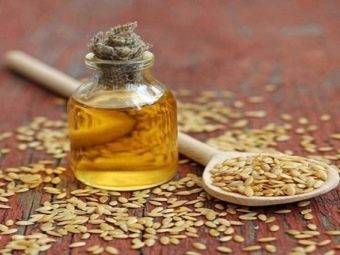
In the later stages, the use of a small amount of products allows you to prepare certain organs for childbirth, in particular, to soften the cervix. This ensures better opening during childbirth.
During lactation, it is recommended to consume the oil not in its pure form, but by adding it to cereals and salads. This will allow the baby to pass on beneficial Omega fatty acids and vitamin E. The latter is believed to improve the taste of milk. However, when it comes to recommendations regarding the use of a particular product during breastfeeding, it is necessary to take into account the health status of the baby.
